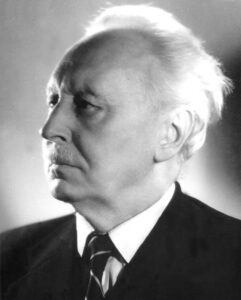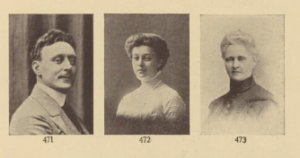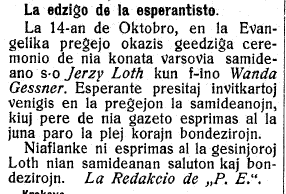One of the most interesting characters in the field of Polish Esperantism is undoubtedly Jerzy Loth. He was tied to the Esperanto movement in various ways, both professionally and within his family. In the period before the First World War, his commitment to the trade section of the Warsaw Esperanto Club stands out in particular.

Born and raised in Warsaw, of Huguenot descent, he started his school education in Warsaw but was expelled from school due to Polish patriotic activity. As a result, he had to finish secondary school in Godesberg in Rhenish Prussia, a province of the German Reich. Later, he studied Economics at the universities in Antwerp, Brussels, and Cambridge and gained knowledge in eleven languages. In 1903, a three-year work stint took him to the USA where he worked in Boston, New York, and Chicago. Subsequently, he worked as a representative of trading companies and conducted scientific research around the globe. In this capacity, he travelled through several countries in the Caribbean, as well as Central and South America. Until he started teaching at the Warsaw School of Political Science (Szkoła Nauk Społecznych i Handlowych) in 1915, he worked professionally in a Warsaw foreign trade company and was socially engaged in various trade organisations.
In 1906 he got to know Esperanto and became a member of the Warsaw Esperanto group where he was a substitute committee member for the years 1909 and 1910. In September 1912, Loth attended the Congress of the International Chamber of Commerce (ICC) in Boston as a representative of the Association of Polish Merchants. In a detailed report in the Pola Esperantisto, he described the circumstances of his journey. At the meeting of Esperanto traders at the Universal Kongress in Kraków in 1912, he announced his intention to travel to Boston. The convention also discussed that his journey would be a welcome idea to promote Esperanto at the Boston congress and suggest using Esperanto as a negotiating language on the ICC congress.

Loth travelled to America with enthusiasm. He prepared his English speech for the congress during the Atlantic crossing and was overwhelmed when he found, on the train from New York to Boston, an advertisement of the New England Telephone Company as a welcome address for the congress participants in a newspaper written in Esperanto. In Boston, Loth was advised by the secretary of congress that his planned speech could not take place because only topics that were pre-determined and printed in the official program were allowed. After this official rejection, he declared to make up for the speech at the next congress in Europe in 1914. Whether this was realized has not yet been determined. Despite all this, he propagated Esperanto among the participants and met various US-American Esperanto officials. After the congress, Loth was introduced to the later US President Woodrow Wilson.
This brief insight into the life of Jerzy Loth shows an example of Esperanto engagement in the trade sector. It demonstrates that he was deeply rooted in his profession and his work in trade and, as with his exemplary engagement at the ICC congress, deliberately used Esperanto in his professional environment. In the interwar period, but especially in the period after the Second World War, he again showed himself to be an extremely committed Esperantist. In the late 1920s and for a longer period in the 1960s he served as president of the Polish Esperanto Association. In addition to his professional activity and Esperanto engagement, he volunteered in numerous organisations, for instance as a founder of the first Polish Rotary club or as a member of the International Olympic Committee. During his time as a member of the IOC, he met many Esperantists on his travels to the Olympic Games to Melbourne, Tokyo, and Mexico, some of whom found him by chance or intentionally looked him up.

Esperanto also had a high value in Loth’s family life. As early as 1909 Loth travelled with family members (brother Emilian, mother Anna, and aunt Emilia) to the congress in Barcelona. The November 1911 issue of Pola Esperantisto contains congratulations from the editors to the newly married couple – they had invited their Esperanto peers with invitation cards in Esperanto. His wife Wanda (née Gessner, 1888-1956) also accompanied him to the Esperanto Congress in Krakow in 1912, which was also attended by members of his family who had already accompanied him to Barcelona. The Esperanto commitment of his brother Emilian, who left an extensive collection to the Polish State Archives in Lodz, is particularly worth mentioning. According to Loth, his brother Emilian was the first in the history of science to submit his doctoral thesis in Chemistry in Esperanto to the University of Lausanne.
Sources:
Boston Chamber of Commerce, Fifth International Congress of Chambers of Commerce and Commercial and Industrial Associations: September and October, 1912 (Boston, 1912).
VIII. Universala Kongreso Esperantista: Albumo (Kraków 1912).
Jerzy Loth, Władysław Miernicki, Public domain, via Wikimedia Commons.
Pola Esperantisto.
Literature:
Stanisław Berezowski, ‘Jerzy Loth (1880-1967)’, in Polski Słownik Biograficzny Volume XVII (1972), pp. 567-569.
Józef Golec, Słownik biograficzny esperantistów polskich (Cieszyn, 2010), pp. 122-123.
Walerian Włodarczyk and Andrzej Pettyn, Esperanto? Wypowiedzi wybitnych polskich intelektualistów (Warsaw, 1964), pp. 67-73.

Elstara personeco apenaŭa konata en la Esperanto-movado.
Amike
Renato Corsetti
Ja estas tiom da fascinaj figuroj inter esperantistoj.
Amike
Bernhard